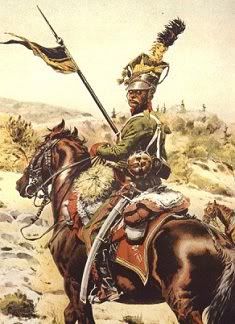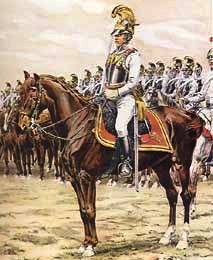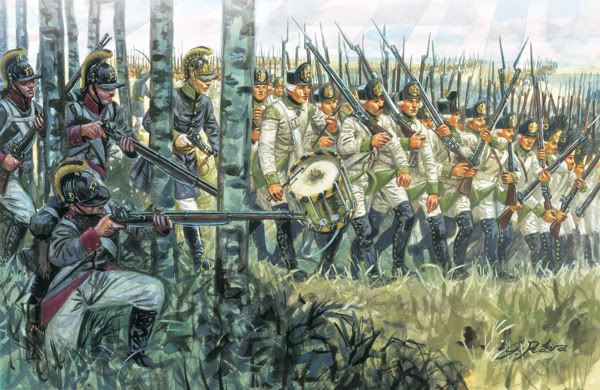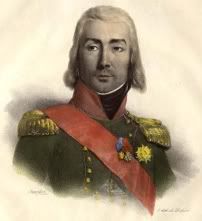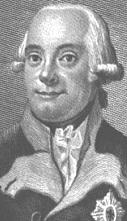The War of the Third Coalition - German-Italian-Balkan Campaign 1806
As the Winter snows cleared and 1806 began, the various nations began to make their moves. The French, keen to follow up their stunning accomplishment at Passau with yet another victory, settled on a more aggressive policy. The coalition decided to pursue a similar policy, hoping to use their superior numbers to attack where the French weren't. The French were indeed outnumbered, and their forces spread thin in some key areas, but they held a strong strategic reserve, could outfight their opponents, and after the victory at Passau, had total confidence in their ability to win.
Italy saw the first action of the year, with the newly reinforced 100,000 man Austrian army of General Radetzky coming up against Massena's 117,500 man Franco-Italian army. The Austrian position was extremely awkward, as though Radetzky felt he could hold an attack by Massena, he was worried by reports that German and Swiss forces were massing in the Tirol, intent on striking his rear. He could not allow either force to go unopposed, as he would be surrounded and destroyed by the other, however, splitting his forces could allow his enemy to destroy him piece by piece.
1. Painting of an Austrian Uhlan, scouting the Tirol for enemy forces.
After lengthy deliberation, Radetzky decided to send a small force of Uhlans to scout the Tirol and report back on enemy strength there, whilst his main force set about preparing the area around Arcole for a French attack. Ordering 25,000 men under the command of Prince Friedrich Hohenlohe to cross the Adige and act as a first line of defence. Meanwhile, Massena, not wishing to repeat the frontal attack of the second Arcole, had decided to try and different approach. On February the 3rd, Radetzky, then at breakfast in the steeple of the church he had made his headquarters, witnessed the Franco-Italian force begin to break camp and move east, attempting to outflank the Austrians. Wasting no time, he gave the order to break camp and set off in pursuit, leaving behind Prince Hohenlohe and his men to guard against any sudden change of course by the French.
With his split force now around 40,000 men smaller than the estimate Franco-Italian one, Radetzky could ill afford to be outpaced by them, for if they crossed the river unopposed, it would surely mean disaster for him and his men. Having left camp a full hour and a half later, it certainly seemed likely that the French would be able to cross, but a forced march by the Austrian forces allowed them to catch up around the town of Legnago, where the French vanguard was already beginning to cross the river. Realising the danger of the situation, Radetzky ordered forward his cavalry to counterattack the French vanguard whilst the rest of his army moved at double pace to the east bank to secure it against attack.
2. Austrian Cuirassiers prepare to counterattack the French crossing.
The French infantry, tired from their march barely had time to form squares before the Austrian Dragoons were upon them. Charge after charge crashed into the French squares, and many began to buckle, their formations growing tighter and tighter as casualties were removed from the line. Between the charges, Austrian horse artillery fired at ranges of only 100 yards into the squares, creating massive gaps in the ranks which the Dragoons then tried to exploit with a well timed charge. After roughly an hour, the French had taken enough, and their commanders ordered a retreat across the bridge, with the rearguard firing as they went and the artillery covering their retreat. The French had taken heavy casualties, and Radetzky was pleased that they had been prevented a foothold on the East bank of the river, but the Austrian Dragoons had also taken losses, and the French had still many more troops in reserve to force a crossing. [-500 Conscripts from France, -500 Regulars from Austria]
It was now 3 in the afternoon, and Radetzky was expecting a full French attack at any time. The bulk of the French forces was hidden either behind the town of Legnago on the opposite bank, or in rough country to either side of the town. The Austrians caught a rare glimpse of formations manoeuvring, but still no attack had come. Gradually the Austrians lowered their guard and began to relax, the soldiers taking the opportunity to have lunch or to talk amongst each other. Radetzky was by now also beginning to relax, the odds of a French attack coming so late in the day were low, as light was fading. It was as Radetzky sat down for supper with his staff at 5:30 that the news came, Massena, having broken off the bulk of his force from those marching, had turned back and struck at Arcole.
3. A group of Voltigeurs leads Massena's advance against Arcole.
Prince Hohenlohe, outnumbered around 3 to 1 and taken by surprise by the furiosity of the French attack, was forced to give ground, and within an hour the French had reached Arcole, where the Austrians attempted to blow the bridge. Just as the mines were to be detonated, French Hussars swept across the bridge and seized the detonator, cutting the wires and allowing Italian infantry to push across the bridge to secure the foothold. The Austrians, still shocked by the attack began to panic, and began to loose cohesion. Pushing forward through the town of Arcole and into the surrounding area, the French and Italian forces were met by varying degrees of resistance, in some places, Regiments had stood firm and only broken when totally surrounded and out of ammunition, in others, they had folded like paper, either fleeing or simply surrendering. By 3pm, Massena had secured the surrounding area, captured a large amount of Austrian equipment which had been left behind during the panicked retreat, and had destroyed a large part of Hohenlohe's force. [-5% Equipment from Austria, -10,000 Regulars from Austria, -1,000 Regulars from France, -1,000 Conscripts from France]
Upon hearing the news, Radetzky swore violently and then proceeded to order a general retreat. With Massena now across at Arcole, in roughly equal numbers to his own, there was no hope to hold his current position. Ordering riders to find what remained of Hohenlohe's force and order them to regroup outside Venice, he began to make preparations for his own retreat. By the morning, the Austrian army had totally disappeared from the Legnago battlefield, and the French diversionary force crossed the river, meeting up with Massena's force and proceeding to march on Venice.
As the French neared Venice, the German and Swiss forces in the Tirol launched their attack. The Austrian scouts, engaging in skirmishes with the enemy's own scouts, quickly estimated the size of the enemy force and sent word back to Radetzky. The news only darkened his mood, and although he was sure his scouts had overestimated, the lowest estimates still meant that he was facing a combined Franco-Italian-German-Swiss force numbering around 160,000, just under twice hjis own strength. Having been able to muster only 85,000 men, Radetzky considered his situation. He could retreat, in an effort to save his army, but that would mean ceding Austrian Italy to the enemy. He could march to meet one of the enemy forces before they joined, but that would mean opening his rear and either Trent or Venice to the other. He could also hold his ground where he was, but that would mean the loss of Trent, and had the potential to lead to him being cut off and destroyed.
Radetzky's choice was made for him however, when new came that the German-Swiss army had laid siege to Trent and the small garrison there would soon be overpowered. Guessing that the force was small enough for him to beat in the field, Radetzky ordered the Army of Italy to march North to Trent, hoping to defeat this force quickly and then move to counter Massena. The Austrian forces made good time, and the enemy forces broke off the siege and retreated North. Joined by the garrison, Radetzky pursued them, bringing them to battle at the village of Lavis, roughly 5km North of Trent.
4. Austrian infantry move forward to attack the German-Swiss force.
The German-Swiss army, under the command of the Bavarian Elector's son, Ludwig, numbered 45,000 men in total, and had taken up a defensive positions using the high ground at the Northern edge of the battlefield. Knowing that Massena was in hot pursuit behind him, Radetzky ordered an immediate attack all along the line, hoping to overwhelm the opposition with numbers and crush them totally. At first, the Austrian forces made little progress against the stalwart defenders, who beat back each attack with well timed volleys and bayonet charges. By early afternoon however, the Austrians were beginning to make good progress, with one Czech regiment even managing to penetrate the enemy's second line, threatening Ludwig's headquarters.
All hope seemed lost for the German-Swiss force, until a staff officer examining the Austrian dispositions through a telescope noticed the approach of the Franco-Italian army. Soon the cry spread throughout the German-Swiss force, and the infantry counterattacked the Austrian advance, charging with bayonets and screaming 'Massena! Massena! Massena!'. They were joined by the cavalry, who drove into centre of the Austrian advance, removing the threat to Ludwig's headquarters and running down many Austrian.
By this point, Radetzky had also learned that Massena's van was close to his rear, and decided to try and retreat before his force was annihilated between the 2 armies. Commanding the 20,000 man rearguard personally, he managed to buy enough time for the bulk of his army to retreat, but despite his best efforts, a large part of the rearguard was overrun, surrounded and captured. Furthermore, the Austrians left behind a large part of their equipment, their haste causing many guns, horses and wagons which had become stuck in the mud to be abandoned. Radetzky himself escaped only by the skin of his teeth, staff officers dragging the General to his horse and leading him away at the head of a cavalry charge to break through the encircling French forces. [-2,500 Regulars from Bavaria, -2,500 Regulars from Switzerland, -500 Regulars from France, -500 Conscripts from France, -22,000 Regulars from Austria, -5% Equipment from Austria, Trent Fallen]
With the route to Venice blocked and pitched battle meaning certain doom, Radetzky decided to withdraw out of Italy to Klagenfurt, in an effort to buy time to allow his men to recover and be reinforced. Massena on the other hand, decided to march South and lay siege to Venice, the small garrison of which surrendered after a 2 month siege which reduced large areas of the city to rubble and left the citizens starving. [-1,500 Regulars from France, -1,500 Conscripts from France, -30 Base Income from Austria, Venice Fallen, Austrian Italy occupied]
5. The opposing commanders, Bessieres (Left) and Prince Hohenlohe-Ingelfingen (Right).
Italy was not the only theatre seeing action however. In the North, both the French and Prussians decided to adopt an aggressive strategy and advance into the others territory. The Prussians elected to make a drive with the bulk of their strength, 150,000 men. The King elected to grant Prince Friedrich Ludwig Hohenlohe-Ingelfingen the command, and ordered that an upcoming young officer, Carl von Clausewitz serve as his aide de camp for the campaign. The French had elected to make a drive at Berlin, but when Bessieres received the order from a rider in plain clothes who claimed to be from the French war ministry, he dismissed it as a ridiculous ploy by the Coalition to make him attack into insurmountable odds.
When the Prussians made their drive into Hanover, there was little the French could do to resist. Bessieres, realising that he could not hope to hold a force 3 times his number in the field, dispatched 10,000 men to garrison Hanover and beat a retreat back to the Netherlands, were he joined with Batavian forces and called for reinforcements to help stop any Prussian advance and then counterattack. No Prussian attack came however, as the Prussians decided to spend the rest of the year solidifying their gains in Hanover, capturing the outlying towns with help from the Russian fleet along the coast and placing the city itself under siege. Although the city did not fall, strong progress was made by the Prussian forces, and without a relief soon, it looked as if the city would fall. [-5,000 Regulars from France, -7,500 Regulars from Prussia, Hanover in Prussian hands, City under siege]
Meanwhile, Bavarian and Russian forces were both involved in putting down rebellions, albeit of differing natures. The Bavarians sent their newly raised light infantry into the Tirol, where they joined up with the forces left behind and set about trying to secure the Tirol. Despite their best efforts, little progress was made, and Bavarian control outside the towns and cities was limited at best. The Tirolian militia fought back with a grim determination, and although they could not challenge the Bavarians in the field, they set cunning ambushes for the Germans, surprising and wiping out small patrols. [-500 Regulars from Bavaria, Bavarian control of Tirol limited]
6. Cossacks, considered savage barbarians by many, raid the Hungarian countryside.
The Russians were involved in putting down the Hungarian General Uprising, the Tsar having ordered a 75,000 man cavalry heavy force assembled in response to the signs of revolt brewing in Hungary. The Russian force was ordered to make a heavy raid into Hungary, and met little opposition in their advance. They torched a large part of Northern Hungary, and dealt considerable damage to the rebellions cause, but they did not approach any of the major cities, their cavalry heavy force being unsuited for either siege work or for pitched battle against the enemy forces. Their raiding did have on adverse effect however, and that was to steel many Hungarians, enraged by the torching of their property, rape of their women and theft of their riches, against both the Russians and the Austrians. [-500 Conscripts from Russia, +20 Gold to Russia]
The Russians were also moving in Germany, where the 150,000 man army of General Kutusov struck like a sledgehammer at the northern border of Bavaria. The forces left to guard the border were nowhere near enough to even trouble the Russians, outnumbered as they were 10 to 1. Taking heavy losses from Russian hammer blows, many of them scattered to the wind, whilst a pitiful number regrouped in Munich, preparing the city for a siege. The Russians arrived in late May, and quickly set about digging siege lines around the city, from which the countless Russian guns thundered at the city. The defenders, barely 5,000 strong, were outnumbered 30 to 1 by the Russians, and assault after assault wore them thinner and thinner until by early August, they could hold no longer. The defences shattered, the Russians poured into the city and the Imperial standard was raised over the Marienplatz, shocking many Bavarians and causing them to doubt the Elector's judgement in joining the war. [-1,000 Regulars from Bavaria, -9,500 Conscripts from Bavaria, -3 Stability from Bavaria, -275 Base Income from Bavaria, Large parts of Bavaria including Munich occupied]
The main focus of the war however, was still on Napoleon and the Franco-German force now bearing down on Vienna. In what would become known as the Danube Campaign, the balance of forces would seem to be in the Coalitions favour. Although Archduke Charles, even with reinforcements, had only 90,000 men to guard Vienna. To the north however, the main coalition force was camped around Prague. Here, 150,000 Russians under Bagration, accompanied by 140,000 Austrians under Archduke John stood ready to strike from the North. Napoleon had only 192,500 men, and although the coalition forces were split, with the Danube in between them, they still outnumbered him nearly 2 to 1 when combined. Because of this, Napoleon chose to pursue a very aggressive strategy, hoping to annihilate Archduke Charles command and seize Vienna, then turn an use the Danube to defeat the reinforcements coming from the North. The coalition pursued a more conservative strategy, Archduke Charles took up position at the outskirts of Vienna hoping to buy as much time as possible, while Bagration was under orders from the Tsar to avoid engaging Napoleon in anything larger than a skirmish, due to fear of a major defeat.
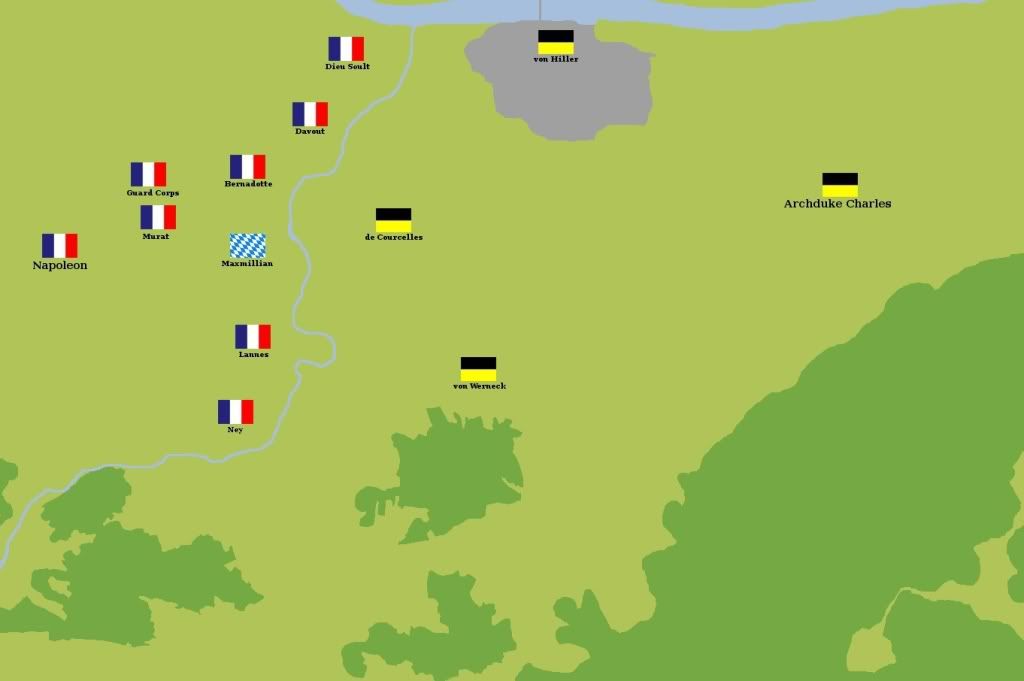
7. Initial dispositions at the Battle of Tulln.
In early March, Napoleon moved out of Linz with great haste, looking to swiftly crush Archduke Charles in a single decisive battle and take Vienna. The 2 forces met at the town of Tulln, with the Danube to their North and close forested country to their South. Here, Charles felt that he could negate Napoleons superiority in cavalry and fight him to a standstill, long enough for Bagration, who he believed to be already en route, to reach him. Through frantic efforts, the Archduke had managed to press an extra 25,000 men into service, though the quality of these troops left much to be desired, many simply being armed members of the peasantry. As dawn broke on the 7th of March, Archduke Charles made his dispositions and informed his officers of the plan, von Hiller was to take the strongest corps, made up of 30,000 men, and hold Tulln and the surrounding area, on no account allowing himself to be separated from the Danube and thus from potential reinforcement, de Courselles, commanding the weakest corps of 25,000 men, and a large part of the militia, was to hold the centre, while von Werneck took 30,000 men and held the South. Meanwhile, Archduke Charles kept a 30,000 strong reserve under his personal command. Meanwhile, the French and German forces arrayed themselves to the West, with much more depth than the thinly spread Austrians.
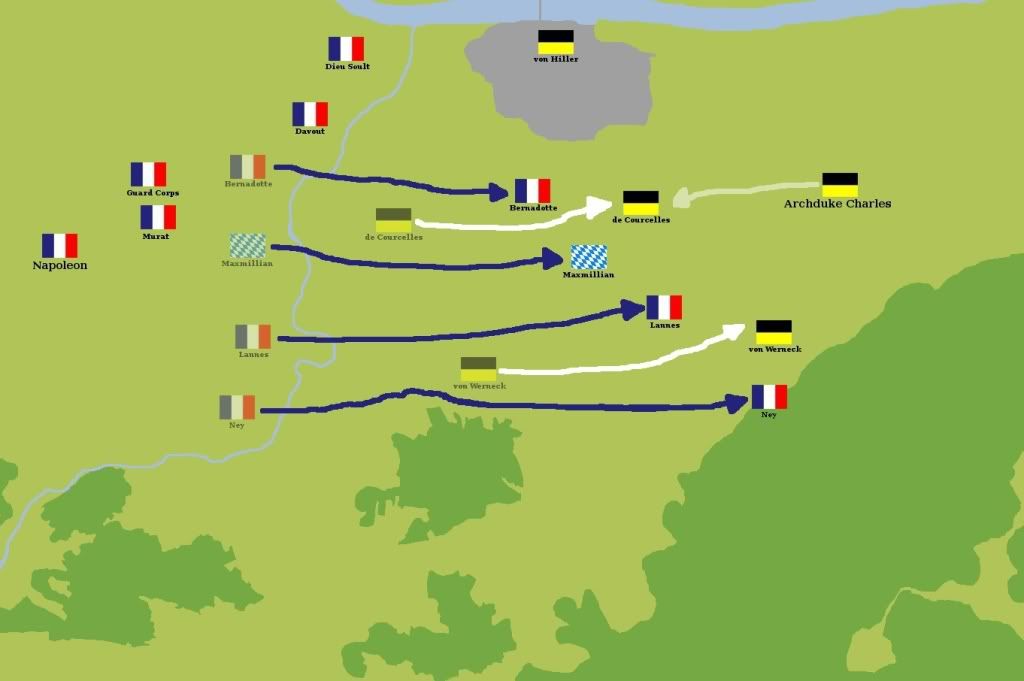
8. Positions at 2pm.
The attack began at 9:00, with Napoleon sending Bernadotte and the South German forces under Elector Maxmillian to test the Austrian centre under de Courcelles. They made good progress, severely denting the Austrian line and routing many of the militiamen, most of whom fired only one volley before dropping their arms and fleeing the field. The attack continued, with the Austrian centre nearing collapse but the French forces also becoming tired from the fighting. At 11:00, Archduke Charles committed 10,000 men, a full 3rd of his reserve to holding back the centre attack. In a fierce fight, the Austrians managed to hold their ground against the French attack and stall it, but they had taken heavy losses, and the Austrian lines had now taken the form of a crescent, the tips towards the French.
Seeing this, Charles ordered that von Werneck, now under attack by Lannes, fall back to maintain formation with de Courcelles. The Austrian troops managed to retreat, but with quite some difficulty due to French harassment. Lannes and Ney then proceeded to push at the South of the Austrian line, the French Chasseurs and Voltigeurs leading a large part of Ney's infantry through the woodlands to the south in an attempt to flank the Austrian positions. Here, they were met by the Austrian Jägers and Grenzers, who put up a fierce resistance among the trees. The tall trees and dense underbrush provided excellent cover for the light infantry, and they scattered throughout the trees, moving forward in loose formations and picking their targets individually. The French, superior to their Austrian opponents, got the best of the engagement, and soon Ney's men were pushing von Werneck's light infantry screen back and back, outflanking his main force on the plains and posing a threat to the Austrian left. Charles responded by committing another 5,000 men of his reserve to counter this threat, in an effort to buy more time.
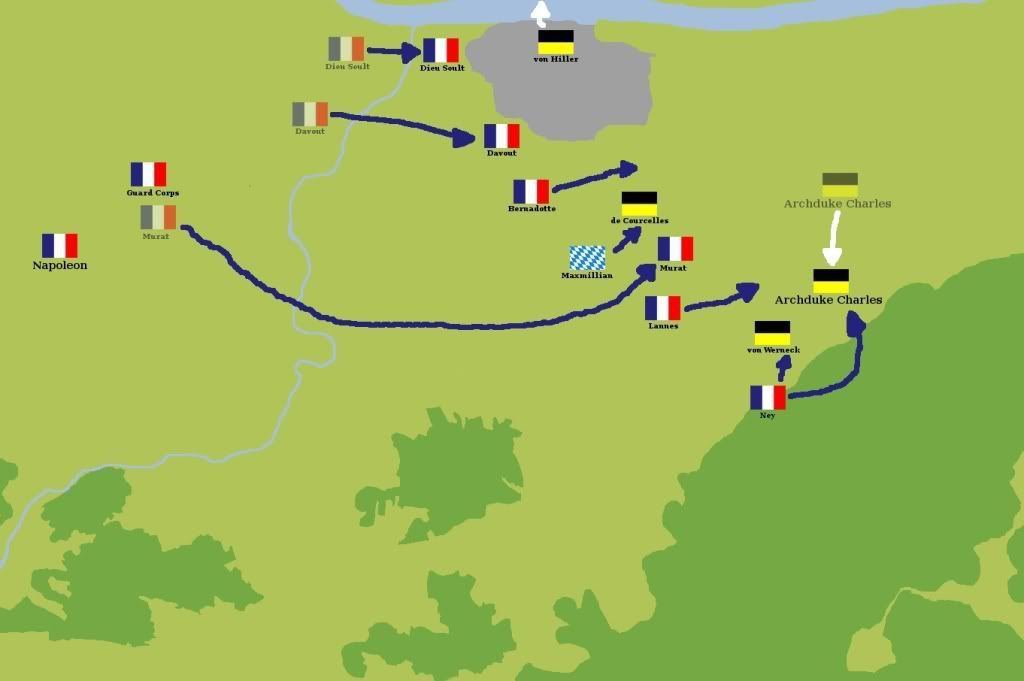
9. Positions at 4pm.
By 3:00, the situation on the Austrian left was deteriorating rapidly, and Napoleon had committed Murat's strength to help Bernadotte and the Germans push through the Austrian centre. With huge cavalry support, the French and German forces surged with renewed energy into the Austrian centre, and split it in 2. With the line broken, Archduke Charles personally led his remaining 15,000 reserves in a last attempt to plug the gap, but with over 60,000 men punching through his thinly held line, and the left flank buckling under the attacks of Ney and Lannes, there was little hope.
By 4:00, the situation had turned from desperate to hopeless, and von Hiller, who had hardly engaged the enemy all day decided to retreat across the Danube in an attempt to save his corps and meet up with the Coalition forces coming down from Bohemia. Napoleon, keen to make sure no enemy force left the battlefield unbloodied, sent Dieu Soult and Davout to catch von Hiller's rear and hopefully inflict some losses upon it. Advancing swiftly over the open ground, the French forces entered Tulln and encountered the Austrian forces rearguard, resistance was stiff, and little progress could be made through the tight cobbled streets, allowing the vast majority of von Hiller's men to escape to the North, the French did succeed in trapping the rearguard however, as French artillery firing upon the bridge hit a key support, collapsing the structure.
The Austrians were now in full retreat across the entire battlefield, von Hiller and his men were carrying out a 'strategic withdrawal' to the North whilst Charles, de Courselles and von Werneck tried to patch the innumerable holes in their line that were now appearing. With no reinforcement in sight and the battle lost, the Austrian forces broke and ran from the field, many of them being cut down or captured by the French cavalry. Archduke Charles, refusing the flee and desert his men was captured by Murat himself, who led a cavalry charge at the Austrian commanders command post. By 5:00, the destruction of Austrian forces was complete, Archduke Charles and von Werneck had been captured, thousands of Austrians had been killed, captured or fled, many of whom simply gave up hope and never returned, 2 huge defeats within a year of each other, coupled with the Hungarian revolt proving too much for them to cope with. [-1,500 Regulars from France, -2,500 Conscripts from France, -500 Regulars from Bavaria, -26,500 Regulars from Austria, Militia forces routed]

10. Napoleon receives the keys to Vienna, as a token of the city's surrender.
Archduke Ferdinand, having recently returned from Bohemia, was now in command of the Austrian forces in defence of Vienna, but could muster only a pitiful force. The militiamen had all fled, disappearing into the local populace, along with many regular soldiers. Altogether, the Archduke could muster only 35,000 men for the defence of the city, a force which Napoleon easily swept aside the next day, many of them being too tired, afraid or apathetic to resist. With all resistance futile and no hope of reinforcement, Ferdinand surrendered his sword to Napoleon at 1pm, just 2 hours after he had first been engaged. Napoleon then proceeded to enter Vienna at the head of a triumphant parade, the Austrians powerless to resist the capture of both their capital and their Emperor, who was caught trying to flee by a group of Bavarian Hussars. The news of this double blow spread like fire throughout the Empire, causing shock amongst loyalists and giving hope to separatists. [-35,000 Regulars from Austria, -70 Base Income from Austria, -3 Stability from Austria Vienna captured by the French, Emperor Francis French hostage]
The Coalition forces in Bohemia, whilst perhaps overly cautious, were not totally inactive. Although they had set out later than Napoleon, and had moved slower, due to Bagration's insistence on thorough scouting, they picked up pace after meeting with von Hiller's corps and hearing of the defeat at Tulln, and although they arrived at the Danube too late to stop the fall of Vienna, there was still time to salvage something from the years campaigning. However, Bagration was under orders to avoid anything more than a heavy skirmish with Napoleon unless conditions were favourable. Because of this, he was reluctant to make a move across the Danube when any such move would likely be met with heavy French resistance which would result in high losses for little gain. Furthermore, many of the Austrian soldiers were unwilling to risk their lives, expecting peace between their nation and France to come soon, and seeing no reason to die when soon the war might be over. Because of this, only minor skirmishes along the Danube took place through the rest of the year, with the Coalition forces probing various crossings for resistance, which was nearly always found in some form. [-1,500 Regulars from Russia, -500 Regulars from France, -500 Regulars from Bavaria]


